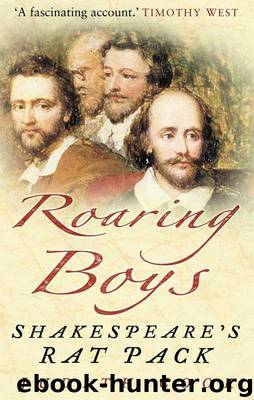Roaring Boys by Judith Cook

Author:Judith Cook
Language: eng
Format: mobi, epub
ISBN: 9780752495095
Publisher: The History Press
Published: 0101-01-01T00:00:00+00:00
EIGHT
A Visit to the Playhouse
A play’s a true transparent crystal mirror,
To show good minds their mirth, the bad their terror.
Thomas Heywood, Apology for Actors (1607)
Theatre was now fully professional, employing substantial numbers of actors, dramatists, apprentices, stage staff, scenery, costume and wig makers. But what of the vital element without which it would all have been pointless? Enter the audience. So who were they? Playhouse audiences crossed every social and economic boundary, from the patron and his noble friends (although he could also arrange for his players to perform at one of his houses), to the ‘groundling’, hard-pressed to scrape a living sufficient to give him one good meal a day. Certainly there would have been the well off and those who had been to college or, at the very least, were able to read and write but the majority would have been illiterate, which is why very often a play is preceded either by a dumbshow giving a brief résumé of the plot (as in the play within the play in Hamlet), or an actor coming on (as described by Dekker) to present a Prologue speech explaining the nature of the piece the audience is about to see. A good example of this is the Chorus in Shakespeare’s Henry V. What was being offered, in fact, was the equivalent of today’s programme notes.
While we know that audiences were often noisy and that many of them might choose bear-baiting or a Tyburn hanging as their next choice of entertainment, what almost all of them most certainly had was an ability to listen. Their attention span was far greater than that of an average audience, indeed the average person today for obvious reasons. There was no Elizabethan equivalent of zapping around the television stations or surfing the net. They were used to taking in information through their ears, not least because from childhood they were forced to listen to long sermons of a Sunday.
As for the language of Shakespeare or the King James Bible, considered far too difficult for most of today’s students, it was not even then normal everyday speech, as we know from exchanges between the women in the Merry Wives of Windsor or the mechanicals in A Midsummer Night’s Dream. But the rich verse and heightened prose of Marlowe and Shakespeare and the convoluted texts of Ben Jonson were accepted and understood, along with the wordplay and punning so beloved of the Elizabethans. Most of all, people loved a good story at a time when the oral tradition remained strong and folk still told each other tales on a winter’s night. As a consequence, when spectacle was added to narrative, along with fighting, tearing passions, great deeds, and strong, declamatory acting, then an audience would give a play their best attention.
A typical visit to the theatre at the end of the sixteenth century might go something like this. A single would-be playgoer, most likely a man since it was rare for women to go unaccompanied, having seen the
Download
This site does not store any files on its server. We only index and link to content provided by other sites. Please contact the content providers to delete copyright contents if any and email us, we'll remove relevant links or contents immediately.
Aircraft Design of WWII: A Sketchbook by Lockheed Aircraft Corporation(32274)
The Great Music City by Andrea Baker(31902)
Call Me by Your Name by André Aciman(20468)
The Secret History by Donna Tartt(19002)
The Art of Boudoir Photography: How to Create Stunning Photographs of Women by Christa Meola(18604)
Shoot Sexy by Ryan Armbrust(17713)
Plagued by Fire by Paul Hendrickson(17393)
Portrait Mastery in Black & White: Learn the Signature Style of a Legendary Photographer by Tim Kelly(16994)
Adobe Camera Raw For Digital Photographers Only by Rob Sheppard(16958)
Photographically Speaking: A Deeper Look at Creating Stronger Images (Eva Spring's Library) by David duChemin(16671)
Ready Player One by Cline Ernest(14619)
Pimp by Iceberg Slim(14465)
Bombshells: Glamour Girls of a Lifetime by Sullivan Steve(14039)
The Goal (Off-Campus #4) by Elle Kennedy(13640)
Art Nude Photography Explained: How to Photograph and Understand Great Art Nude Images by Simon Walden(13022)
Kathy Andrews Collection by Kathy Andrews(11795)
The Priory of the Orange Tree by Samantha Shannon(9045)
The remains of the day by Kazuo Ishiguro(8951)
Thirteen Reasons Why by Jay Asher(8874)
